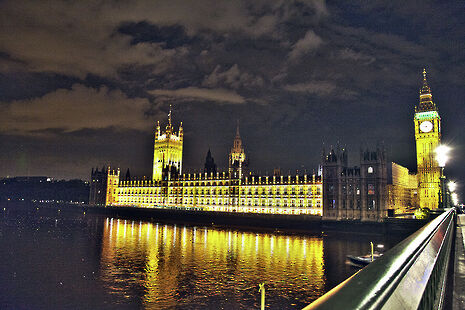Politicians love their children too
Politicians are no better than we are – but nor are they any worse, argues Richard Nicholl

Did you vote on 22 May? I did – by post for my council at home and in person for the European Parliament and Cambridge City Council. Yet the official figures for the constituency of Cambridge show that just over half the residents, including students, didn’t vote at all, either for Europe or for the council.
In this era of Russell Brand cynicism about voting, it’s worth asking why people don’t turn out. In a left-wing enclave like the constituency of Cambridge, at present a little yellow island in a sea of Tory blue, it’s quite possible that many people are not adequately represented by the more moderate candidates who stand a chance of winning; equally, crotchety old men tell us how lazy the youth are today and that they can’t be bothered to do their civic duty. Whatever the reason, it seems unlikely we will ever reach the dizzying heights of 1950, where 83.9 per cent of the electorate turned out to re-elect Clement Attlee’s Labour Party – the turnout at the last general election was comparatively high, and even it only reached a turnout of 65.1 per cent.
The refrain one hears constantly, though, is that politicians are all the same, and with Nigel Farage’s star in the ascendant this might be more relevant than ever. Moreover, it seems this homogeneity is most pronounced in negative qualities – chiefly duplicity, dishonesty and greed. Not only are they all the same, so the argument runs, they’ve all got their snouts in the trough.
This inescapably oversimplifies the issue. The obvious response is that there are individuals in politics who defy the trend – for instance, Estelle Morris, who resigned as Education Secretary in the last government not for political reasons but because she felt unable to do the job adequately. Similarly, David Davis risked his seat in a by-election and resigned as Shadow Home Secretary to bring an electoral challenge to the Blair government’s policies on 42-day detention without trial, while the last MP for Cambridge, David Howarth, highlighted and almost single-handedly stopped the original form of the Legislative and Regulatory Reform Act 2006, which would have transferred a colossal amount of legislative power from Parliament to the Cabinet. These are hardly the acts of malevolent careerists.
Yet this is not an adequate response when the problem is seen to be systemic, in the same way as the existence of white people who aren’t racists doesn’t invalidate the We Too Are Cambridge project. The real solution to the problem of conniving politicians is unfortunately not an easy one – indeed, I would argue it is unresolvable.
Undoubtedly, any system of politics where there is a possibility of career advancement will encourage a degree of self-interest. For many politicians, their career will come first and their other responsibilities – as a representative and public servant – come a far second. This is not something we can get rid of without totally reimagining how democracy works. In a similar vein, the profession attracts those whose egos are easily massaged, and in an era of mass media this is irreversible.
Yet, despite a slightly higher concentration of narcissists than other professions, politicians are simply not qualitatively different than normal people. Contrary to the efforts of certain lobbyists to portray the entire political class as a race of androids bleeping along to orders from the mothership, they eat, drink, sleep, have sex, bear children and even go to the toilet. Politicians are not any different to us beyond a higher media profile and a slightly narrower range of interests.
This is why, as I said earlier, the problem of conniving politicians is unresolvable. Politicians are no worse than we are – and crucially, they are no better either. Without the promise of power, we proles can speculate on the morality of politicians without consequence. But would we be so different? Are we really moral exemplars ruled by Saturday morning cartoon villains – or is the truth not simply that politicians are not generally bad people, but just unexceptional people in exceptional careers?
It seems we have forgotten what democracy really means – rule by the people. So why are we surprised our rulers have all the biases, moral failings and weaknesses of the rest of us? Some people are horrible, and so are some politicians, whether this means a sleaze like Berlusconi or a nasty little lobbyist’s hand puppet like the recently-removed Patrick Mercer MP.
Luckily, the political class, like the general public, is also capable of producing a hero or two: individuals whose capacity for self-sacrifice and doing the right thing will change their country and the world forever. Not everyone can be a Mandela, but not everyone is a Hitler either. We should expect moral fibre from our rulers, but we should be aware of human frailty. We are them – and they are us.
Agree? Disagree? Let us know at comment@varsity.co.uk
 News / Night Climbers call for Cambridge to cut ties with Israel in new stunt15 April 2024
News / Night Climbers call for Cambridge to cut ties with Israel in new stunt15 April 2024 News / Police to stop searching for stolen Fitzwilliam jade17 April 2024
News / Police to stop searching for stolen Fitzwilliam jade17 April 2024 News / Cambridge University cancer hospital opposed by environmental agency12 April 2024
News / Cambridge University cancer hospital opposed by environmental agency12 April 2024 Interviews / In conversation with Dorothy Byrne1 March 2024
Interviews / In conversation with Dorothy Byrne1 March 2024 Interviews / ‘It fills you with a sense of awe’: the year abroad experience17 April 2024
Interviews / ‘It fills you with a sense of awe’: the year abroad experience17 April 2024


